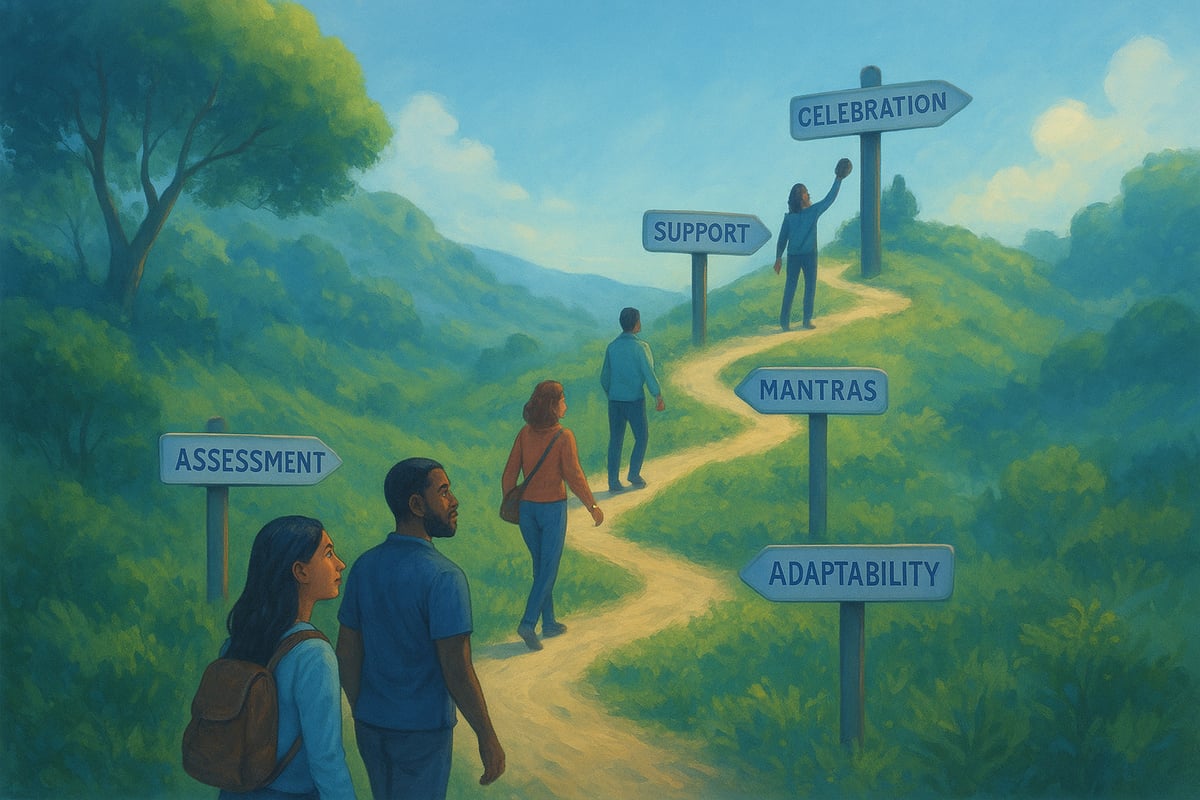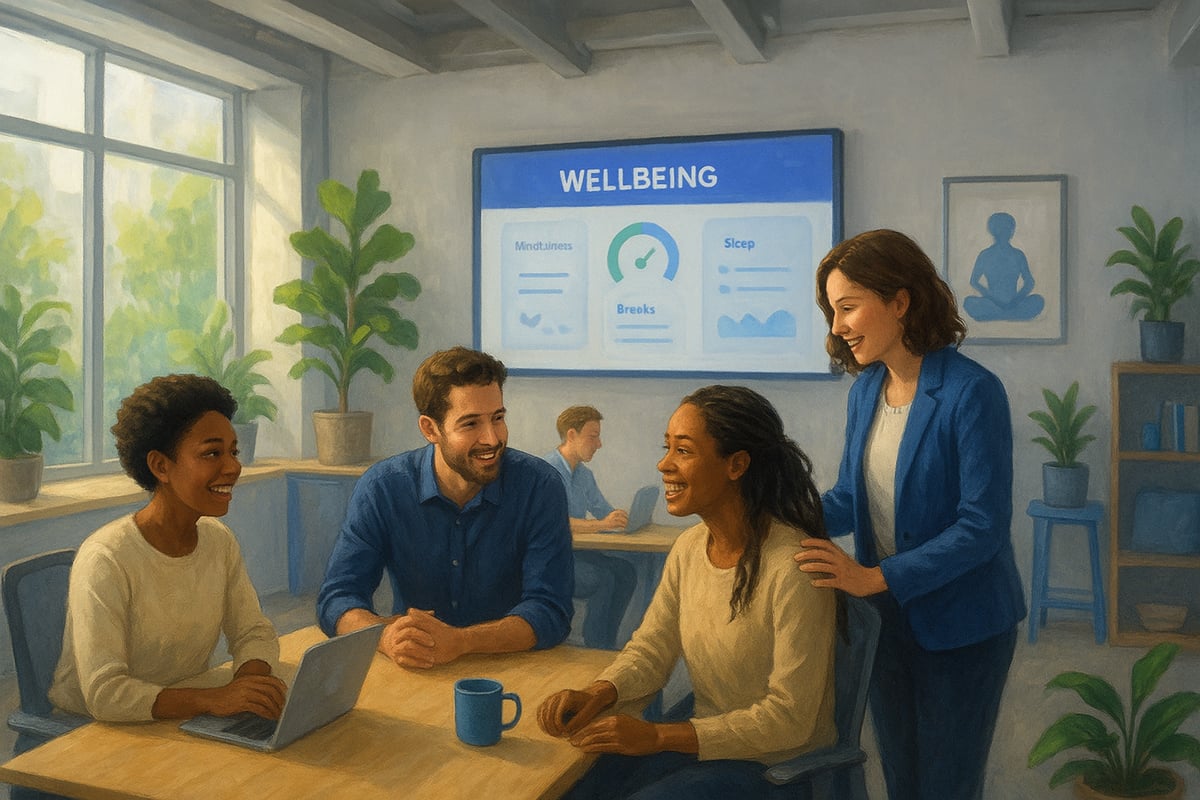In 2025, the true measure of wealth is shifting. Today, mental health is at the heart of personal and professional success.
Across the globe, more people recognize that wellbeing is the foundation of productivity and happiness. Mental health shapes how we perform at work, connect with others, and care for our bodies.
If you want to thrive, you need practical steps and up-to-date strategies. This guide will help you build a resilient mind for the year ahead.
Use this as your roadmap to sustainable success. Discover why mental health is wealth, the science behind wellbeing, and actionable strategies for every day.
Why Mental Health Is the New Wealth
In today’s fast-changing world, the phrase “mental health is wealth” is more than a slogan. It is a guiding principle for individuals, organizations, and communities seeking sustainable success. As priorities shift in 2025, people are recognizing that real prosperity is measured not just by financial gains, but by the strength and resilience of the mind.

The Evolving Definition of Wealth
Wealth is no longer confined to financial assets or material possessions. In 2025, mental health is wealth means that emotional, psychological, and social wellbeing are equally vital components of a prosperous life. Quality of life, happiness, and meaningful relationships now define what it means to be truly wealthy.
This shift in public perception is evident across all sectors. Mental health is wealth for CEOs, entrepreneurs, and employees alike. High-net-worth individuals and industry leaders are investing in coaching, therapy, and resilience training, treating mental wellness as a strategic asset. Organizations are seeing up to 79% reductions in employee mental health problems when they prioritize wellbeing programs, according to recent WMHI data.
Today, ignoring mental health can undermine one’s ability to enjoy or sustain material success. Mental health is wealth because it is a form of relational capital—the energy and resilience needed to navigate life’s challenges and build deeper connections. Real-life stories abound of executives and professionals who, after focusing on mental health, report sharper decision-making, improved creativity, and more fulfilling relationships.
For organizations seeking to embed these values, Building a Mentally Wealthy Workplace demonstrates how mental wealth is integral to workplace culture and long-term growth. This approach turns wellbeing into a measurable, strategic advantage.
Modern wealth includes:
- Emotional intelligence and self-awareness
- Psychological resilience in facing adversity
- Strong, supportive relationships
- Physical health and life satisfaction
The mental health is wealth mindset is transforming how success is defined and achieved.
The Hidden Costs of Poor Mental Health
While mental health is wealth, the hidden costs of neglecting it are significant. Chronic stress, burnout, and anxiety silently drain productivity and diminish happiness. Many high-performers normalize these pressures, which can lead to serious health issues such as heart disease and cognitive decline.
Organizations that overlook mental health face increased absenteeism, lower engagement, and higher turnover. Recent findings show a 33% reduction in absenteeism after targeted mental health interventions, reinforcing the idea that investing in wellbeing pays dividends.
Poor mental health saps emotional vitality—confidence, optimism, and resilience that fuel everyday performance. When these qualities are depleted, even the most talented individuals struggle to reach their potential. The unrecognized value of mental health is wealth is that it unlocks hidden reserves of creativity, motivation, and satisfaction.
Key impacts of poor mental health:
- Increased risk of chronic illness
- Reduced workplace productivity
- Weakened personal relationships
- Loss of motivation and zest for life
Embracing the truth that mental health is wealth empowers both individuals and organizations to prioritize wellbeing as the foundation for lasting success.
The Science of Mental Wellness in 2025
Understanding why mental health is wealth requires a closer look at the science behind our minds and bodies. In 2025, breakthroughs in neuroscience, psychology, and technology are reshaping how we approach mental wellness. Let’s explore the foundations that can help you build a resilient, thriving mind for the year ahead.

Mind-Body Connection and the Role of the Brain
The last decade has brought a deeper understanding of how our mental and physical states are intertwined. When discussing why mental health is wealth, it’s crucial to recognize that stress, trauma, and emotions directly influence not only brain function but also physical health outcomes.
Neuroscience shows that chronic stress can accelerate aging and increase disease risk. The brain’s stress response, if left unchecked, can disrupt sleep, immune function, and even lead to long-term cognitive decline. The parasympathetic nervous system acts as the body’s natural brake, promoting calm, clarity, and recovery.
Recognizing your body’s stress signals—like tension, fatigue, or irritability—serves as the first step in protecting your mental health. By tuning into these cues, you can take proactive steps to reset and recharge.
Recent research confirms that leaders and professionals who prioritize their mind-body connection report improved focus, decision-making, and overall satisfaction. In 2025, embracing this holistic approach is not optional. It is the backbone of the belief that mental health is wealth.
Growth Mindset and Emotional Intelligence
Building on the mind-body foundation, a growth mindset and emotional intelligence are essential skills for mental resilience. Carol Dweck’s research on growth mindset reveals that believing in the ability to develop skills and intelligence fosters adaptability and perseverance.
Within organizations, leaders who promote a growth mindset culture inspire innovation and support both individual and team wellbeing. Mental health is wealth becomes more than a saying—it is a daily practice of learning, adapting, and supporting others.
Emotional intelligence, the ability to recognize and manage your emotions, is equally vital. Techniques such as labeling feelings, pausing to assess situations, and practicing mindfulness help regulate emotional responses. These habits strengthen self-awareness and confidence, which are at the core of mental health is wealth.
In 2025, professionals who master these skills are better equipped to navigate uncertainty, recover from setbacks, and maintain strong relationships. As emotional intelligence grows, so does your capacity to thrive in the face of change.
Technology and Trends in Mental Health
Emerging technology is revolutionizing the way we understand and support mental wellness. Tools like biofeedback, EEG, and functional MRI offer real-time insights into brain activity, empowering individuals to optimize mental performance. Clinics and digital apps now provide personalized brain health programs, making advanced care more accessible.
Holistic fitness trends are integrating mental health into daily routines, with many people using wearable devices to track mood, sleep, and stress. These innovations reinforce that mental health is wealth, as they help individuals take charge of their wellbeing.
Open conversations around mental health, supported by technology, are breaking down stigma and encouraging more people to seek help. For example, platforms like Mental Health Wellbeing Conversations facilitate community and dialogue, further embedding mental wellness as a core value in society.
As these trends continue, the tools to safeguard your mental health are more effective and widely available than ever. By leveraging technology and embracing open communication, you can future-proof your mental wealth in the digital age.
Building Your 2025 Wellness Roadmap: Step-by-Step Guide
Embarking on your 2025 journey to mental wellness requires a clear, actionable plan. If you believe that mental health is wealth, then treating your mind as your most valuable asset is essential. This roadmap will guide you through each step, equipping you with practical strategies to build resilience, foster growth, and truly thrive in the year ahead.

Step 1: Assess Your Current Mental Wealth
Start by understanding where you are. Self-reflection is a cornerstone of the mental health is wealth philosophy. Use tools like journaling, digital mood trackers, or workplace wellbeing assessments to establish your baseline. These methods provide insight into your emotional patterns, stressors, and strengths.
For organizations and individuals alike, structured assessments can reveal hidden opportunities for growth. For example, digital platforms and employee surveys offer objective data on team morale and stress levels. According to recent research, teams that complete regular wellbeing assessments report measurable improvements in performance and engagement.
To further your journey, consider exploring Workplace Wellbeing Assessment Insights for practical tools and benefits tailored to your needs. Remember, acknowledging where you stand is the first investment in your mental wealth.
Step 2: Set Clear, Personal Wellbeing Goals
Once you have a baseline, define your vision for the future. Mental health is wealth grows with intention, so set goals that are specific, measurable, achievable, relevant, and time-bound (SMART). Instead of a vague aim like “I want to feel less stressed,” try “I will practice mindfulness for 10 minutes each morning for the next three months.”
Clear goals provide direction and motivation. For example, you might aim to reduce anxiety episodes by 50 percent or improve sleep quality within a set timeframe. Tracking progress toward these objectives helps you stay accountable and fosters a sense of achievement.
By regularly revisiting your goals, you ensure they remain aligned with your evolving needs. This proactive approach turns aspirations into tangible results, reinforcing the principle that mental health is wealth.
Step 3: Implement Daily Resilience Practices
Building resilience is essential for weathering life’s challenges. Integrate small, evidence-based practices into your daily routine to strengthen your mental health is wealth foundation. Mindfulness and meditation are proven techniques for reducing stress and promoting calm.
Set aside moments of stillness and reflection, even if only for a few minutes each day. High performers often rely on deep breathing, mindful pauses, and gratitude exercises to maintain focus and composure. Physical activity, quality sleep, and balanced nutrition also play critical roles in supporting brain health.
Consider mixing up your routine with practices like yoga, journaling, or nature walks. These habits create a buffer against stress and boost your emotional reserves, ensuring that your mental health is wealth remains protected.
Step 4: Build Your Support Network
No one achieves sustainable wellbeing in isolation. The mental health is wealth principle emphasizes the value of trusted connections. Identify individuals who genuinely support your growth, whether friends, family, colleagues, or mental health professionals.
Quality matters more than quantity. Focus on nurturing a few meaningful relationships where you feel safe, heard, and empowered. Joining support groups or peer communities can provide additional layers of encouragement and accountability.
Therapy or coaching can also offer expert guidance through life’s complexities. By investing in these relationships, you cultivate emotional wealth that compounds over time and supports your ongoing journey.
Step 5: Embrace Adaptability and Growth
Flexibility is a core strength in the mental health is wealth toolkit. Life circumstances change, and your strategies should adapt accordingly. When a coping method no longer serves you, be willing to try something different, such as switching from meditation to creative expression or outdoor activities.
Setbacks are inevitable, but each one holds a lesson. Reflect on challenges and identify the “hidden gems” of growth they reveal. This mindset fosters resilience, making you better equipped to handle future stressors.
Continuous learning and adaptability ensure your mental wealth keeps expanding. Remember, growth is a process, not a destination.
Step 6: Integrate Mantras and Positive Self-Talk
Harness the power of language to shape your mindset. Mantras and affirmations are powerful tools in the mental health is wealth journey. Select phrases that resonate with you, such as “Face Everything and Rise” or “I have hope in what can be.”
Repeat your chosen mantras during moments of doubt or stress. Over time, these positive statements become ingrained habits that reinforce self-belief and motivation. You might write them on sticky notes, set reminders on your phone, or include them in your morning routine.
Consistent positive self-talk gradually shifts your internal narrative, building a foundation of confidence and emotional strength.
Step 7: Track Progress and Celebrate Wins
Sustaining motivation requires regular reflection and celebration. Schedule monthly check-ins to review your mental health is wealth goals and journal your achievements. These moments of acknowledgment, no matter how small, fuel your commitment and highlight your growth.
Use simple tracking tools, like habit trackers or digital apps, to monitor improvements. Share your successes with your support network for added encouragement. Recognizing progress reinforces positive behaviors and makes setbacks feel less daunting.
Celebrating each step forward, however minor, cultivates resilience and reminds you that your investment in mental health is wealth pays ongoing dividends.
Workplace Mental Health: The New Organizational Asset
In today’s fast-changing business world, mental health is wealth. Organizations are recognizing that employee wellbeing is not just a moral imperative, but a core driver of productivity, engagement, and innovation.
As the conversation around mental health evolves, companies of all sizes are shifting their focus from reactive support to proactive investment. The return on investment is clear. For every $10,000 invested in workplace mental health programs, organizations report up to $110,000 in returns, according to global data. This makes mental health is wealth not a slogan, but a measurable business strategy.
| Investment | ROI | Key Outcomes |
|---|---|---|
| $10,000 | Up to $110,000 | Reduction in claims, improved retention, higher performance |
| Wellbeing Programs | 79% reduction in mental health problems | 57% improvement in overall employee wellbeing |
Forward-thinking companies are embedding mental health into their culture and policies. For example, organizations that implement comprehensive wellbeing strategies see 50% fewer psychological injury claims. This not only protects employees, but also reduces costs and enhances organizational reputation.
What are the tangible benefits of treating mental health is wealth as a strategic asset?
- Lower absenteeism and presenteeism
- Increased employee engagement and retention
- Enhanced creativity and innovation
- Stronger team morale and cohesion
- Greater adaptability in times of change
The workplace is rapidly adapting to new realities. According to the 2025 Workplace Mental Health Trends Report, leaders are prioritizing mental health initiatives that are data-driven, inclusive, and focused on long-term resilience. Companies are moving beyond surface-level perks to embrace evidence-based training, flexible work options, and open dialogue about psychological safety.
Yet, challenges remain. Burnout, chronic stress, and anxiety are still significant threats to performance and wellbeing. High-performing teams often normalize stress until it leads to exhaustion or disengagement. Building resilience and protecting mental health is wealth requires practical strategies, such as those found in Preventing and Managing Burnout, which offer proven tools for individuals and leaders alike.
Ultimately, organizations that view mental health is wealth as a vital resource outperform those that treat it as an afterthought. By fostering a culture of care, accountability, and continuous improvement, businesses set the stage for sustainable success. The future belongs to those who invest in the minds and hearts of their people.

Future-Proofing Your Mental Health: Trends & Predictions for 2025
The landscape of mental wellbeing is evolving rapidly. As we look toward 2025, it is clear that mental health is wealth in more ways than ever before. New generations, innovative technologies, and shifting values are shaping how we measure and protect our most important asset.
Gen Z and the Redefinition of Wealth
Gen Z is leading a profound shift in how society views prosperity. For this generation, mental health is wealth, with success defined by fulfillment, purpose, and meaningful relationships—not just financial gain.
Many organizations are responding by prioritizing mental health support and flexible work-life balance. Gen Z employees often choose employers who value wellbeing and social impact. As a result, companies that adapt to this holistic vision are attracting and retaining top talent.
This generational change signals a future where happiness, connection, and resilience are as prized as traditional wealth.
Emerging Technologies and Support Systems
Digital innovation is transforming how we care for our minds. In 2025, teletherapy, AI-driven mental health apps, and digital coaching platforms are more accessible than ever, helping people realize that mental health is wealth in a practical sense.
Wearable devices now track stress, mood, and sleep, offering personalized feedback and real-time support. Biofeedback tools and virtual wellness platforms enable daily self-care, regardless of location or schedule.
Recent Mental Health Statistics 2025 show significant increases in the use of digital mental health tools, reflecting their growing role in prevention and early intervention.
Integrating Wellness into Everyday Life
Making mental wellbeing a daily habit is key for lasting success. Leaders and employees are weaving micro-habits into routines, from mindful breathing between meetings to gratitude journaling before bed. These small actions reinforce that mental health is wealth, helping to build resilience and prevent burnout.
Integrating wellness practices into daily life makes them as routine as brushing your teeth. The focus is on conviction, commitment, and consistency. Over time, these habits create a powerful foundation for sustainable success.
The Role of Coaching and Ongoing Learning
Continuous growth is essential for maintaining mental strength. Executive coaching, digital courses, and regular “mental fitness” sessions are now standard for many professionals who recognize that mental health is wealth.
Coaching helps individuals develop emotional regulation, self-leadership, and adaptability. Online platforms offer flexible learning opportunities for building resilience skills at any career stage. Think of it as taking your mind to the gym—routine training leads to lifelong growth.
Exploring online mental health courses is a proactive step for anyone committed to ongoing development.
Measuring Success: Beyond Bank Accounts
The definition of achievement is expanding, and mental health is wealth is at the center. Organizations now track quality of life, happiness, and wellbeing alongside traditional KPIs.
New metrics focus on emotional vitality, job satisfaction, and sense of belonging. According to Mental Health Statistics 2025, companies investing in wellbeing report higher employee engagement and lower turnover.
For individuals and teams, celebrating progress in mental wellness is as important as financial milestones. This comprehensive approach ensures true, lasting prosperity.
As you look ahead to 2025, prioritizing your mental health isn’t just a personal investment—it’s the cornerstone of lasting success and wellbeing. This guide has unpacked why mental health is your greatest asset, offering practical steps to build resilience, foster supportive connections, and embrace daily habits that fuel both happiness and performance. If you’re ready to take the next step toward a thriving mind and workplace, discover how tailored support and proven strategies can make a measurable difference for you and your team.
Find Out More


